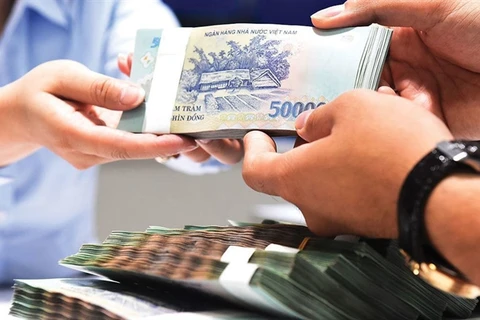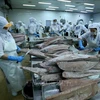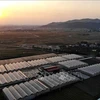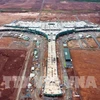Hanoi (VNA) - ADB experts forecast that Vietnam's economy could recover at 6.5 percent this year and grow stronger at 6.7 percent in 2023, due to high vaccination rates and the implementation of expansionary fiscal policies.
On April 6, the Asian Development Bank (ADB) released the Asian Development Outlook Report (ADO 2022), which stated that the Vietnamese economy is ready for a strong recovery in the context of global economy instability.
GDP reaches a high level
ADB experts forecast that Vietnam's economy could recover at a rate of 6.5 percent this year and grow stronger at 6.7 percent in 2023 due to high vaccination rates, trade promotion and continued implementation of expansionary fiscal and monetary policies.
Andrew Jeffries, ADB Country Director for Vietnam, said that high vaccination rates have allowed the Vietnamese Government to lift strict pandemic containment measures. The timely shift in pandemic containment strategy has helped restore economic activities and ease bottlenecks in the business environment, the ADB official emphasised.
Nguyen Minh Cuong, principal country economist at the ADB, said the recovery is possible because of the Government's economic recovery and development program (ERDP).
Specifically, the program in 2022 and 2023 includes fiscal solutions such as tax exemption and reduction policies, health care support, and infrastructure development. The program also includes social welfare and interest rate support for businesses and business households.
ERDP's monetary solutions will provide more liquidity to the economy as credit institutions are expected to reduce lending rates by 0.5-1 percent this year and next.
Labor market recovery and other stimulus measures will boost industrial growth at 9.5 percent in 2022 as forecast, contributing 3.6 percentage points to GDP growth. Agricultural output is forecast to increase by 3.5 percent this year, contributing 0.4 percentage points to GDP growth thanks to a recovery in domestic demand and rising global commodity prices.
The Government's tourism reopening policies implemented in March and the expected lifting of pandemic control measures will boost the service sector, with a forecast growth of 5.5 percent, contributing 2.3 percentage points to GDP growth this year. Meanwhile, increased disbursement will boost construction and related economic activities.
In addition, the Government's economic recovery and development program will increase public investment and stimulate domestic demand. Increased coordination between central and local governments as well as a recovery in labor mobility will help boost domestic and foreign investors' confidence in Vietnam's economic resilience.
Import and export activities continued to increase strongly this year. The Regional Comprehensive Economic Partnership, effective January 1, is expected to boost trade and economic recovery after the COVID-19 pandemic subsides, by creating stable and long-term export markets for Vietnam and creating a legally binding foundation for trade expansion.
Challenges remain
Assessing the risks of the corporate bond market, especially after the case of President and CEO of Tan Hoang Minh Group, Do Anh Dung, arrested due to the issue of illegal bonds by this enterprise, expert Nguyen Minh Cuong believes that the corporate bond market in Vietnam is growing too fast compared to the response of the platforms both from investors and issuers.
“Many businesses are racing to issue corporate bonds, including small and medium enterprises, while information about businesses and collateral surrounding the issuance remains uncertain," said Cuong.
Cuong also noted that Vietnam's recovery prospects are affected by short-term risks. The high number of COVID-19 infections since mid-March could hamper the economy's return to normal this year. The slow pace of the global economic recovery and high world oil prices due to the conflict between Russia and Ukraine also directly affect Vietnam's import-export activities and domestic oil prices. Inflation is therefore expected to increase by 3.8 percent in 2022 and 4 percent in 2023./.






















